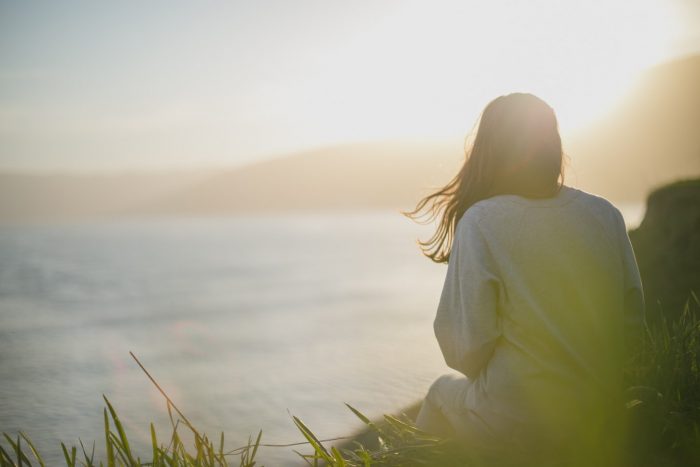“Whether we’re seeking inner peace or global peace or a combination of the two, the way to experience it is to build on the foundation of unconditional openness to all that arises. Peace isn’t an experience free of challenges, free of rough and smooth, it’s an experience that’s expansive enough to include all that arises without feeling threatened.” ~ Pema Chödrön, Taking the Leap: Freeing Ourselves from Old Habits and Fears
~
For starters, I must say that, although I try my best, I don’t meditate every day.
Or when I do, it’s not for an hour or more—so don’t perceive me as a super experienced “meditator.” Bear with me, because we might be in the same boat.
My mind has always been a fertile land of racing thoughts and fears. I have suffered from common anxiety for as long as I can remember.
I was an anxious child who had spontaneous episodes of nausea at school and worried a lot about throwing up in class. After growing up, in college, I had my first panic attack when I was 19 years old and that soon developed into a mild case of agoraphobia. After I healed that aspect of my anxiety, I was finally free to explore the world.
But common anxiety has always been my traveling companion. Although I have been working with energy healing for years now, and that has changed me in marvelous and magical ways, sometimes I still find myself at that place where worry and fear consume me. Why can’t I simply relax and go with the flow? Why do I still have so many fears? Will I ever find “freedom” someday?
Sometimes my judgmental self kicks in and tells me I’m a fraud. Who am I to tell people to meditate, relax, and to stay in touch with their feelings when I’m not in a place of peace all the time? Who am I to tell them to let it go and go with the flow when sometimes I can’t stop worrying too?
I believe that self-criticism comes with the fact that we have all been misinformed about the benefits of meditation.
We have been promised “peace” and “zen.” And trust me, you don’t get that just because you meditate. A lot of people I teach meditation to at a local gym have asked me if they are going to feel “light and happy” after our meditation practice. I realized I’d have to tell my students that meditation doesn’t magically heal their anxiety and stress. While they may feel “light and happy” for the 45 minutes of practice we hold, I can’t promise they’ll feel the same after they carry on with their days. I can’t promise the impossible.
Meditation is a practice just like yoga and other energy healing modalities. You can become better with time, but it’s a practice that makes you realize that you will never be in a peaceful state forever. And you definitely don’t become “zen” after you start meditating.
In fact, I really dislike that word because there has never been anything “zen” about me—at least not the endless serenity that everyone seeks with meditation.
But I can tell you what I’ve gained with meditation: I have learned who I am by dealing with my own imperfections.
We know that there are so many different modalities of meditations. I have now become a meditation junkie and I love different kinds of practices. From transcendental to manifestation and visualization meditations, I’ve probably tried almost everything. From practices such as “tonglen” and “loving-kindness,” which I frequently do with my students, to chakra clearing and spiritual meditations.
But I must confess that, for my uneasy and restless mind and soul, there is nothing like mindfulness meditation.
And I will tell you why:
Only mindfulness allows me to be myself just the way I am. Whole. Flawed. Perfect. Broken. Anxious. Compassionate.
I don’t have to play roles. If I don’t want to be positive today and manifest a better future, I don’t have to do that when I practice mindfulness. I can remain cranky and mindfully watch my crankiness while I meditate. If I am angry, I must take a deep breath and watch that anger that has been rising in me. I don’t have to try to fix or heal anything—I just have to be me. And although being me sometimes sucks, not trying to change a thing can also be liberating!
The core of mindfulness is bringing your full attention to the present moment. You are taught to stay present with your thoughts and emotions. Yes, that includes the “sucky” present moment too. It doesn’t matter if your day is going well or not—being mindful will help you simply show up and be there.
Mindfulness meditation does not promise to bring the “zen” in you. Hell, it might bring the worst in you as you start knowing yourself better—but it will unmask the ulterior aspects of your shadow self. While it might bring you peace and bliss, it can also break you down. Eventually, it will teach you how to deal with your most painful afflictions with grace. How to touch them and then let them go. Naturally. Without pushing.
I really recommend reading Pema Chödrön’s Taking the Leap, Freeing Ourselves from Old Habits and Fears. This short book gave me a whole new perspective on mindfulness, and I confess I didn’t like that kind of meditation so much at first. Since when can you stay with all your mess and find grace in this practice? Her book will definitely answer that question.
Pema Chödrön talks about the “shenpa,” which is a Tibetan word for “attachment,” or, as she also calls it, being “hooked.” Pema says that “shenpa is the itch and it’s also the urge to scratch.” We all have shenpas. Someone cuts us off in traffic and we instantly get “hooked.” We feel angry and motivated to honk and swear. That is a common shenpa in our everyday lives. We all have them, and let’s be honest, we won’t stop having them after we start meditating. The “itch,” the bad feelings, will arise all the time like they always do. But once we become mindful, we learn to embrace that itchiness, that prickly feeling, without reacting to it so much.
Chödrön’s book also has a quote that, at least for me, best summarizes the concept of mindfulness meditation:
“Meditation can be described as learning how to stay with the itch and the urge to scratch without scratching it.”
And that’s how it has changed my life without making me “zen.”
I can’t get rid of the “scratch.” I can’t change my anxiety. I can’t change the fact that I often get angry when I see the world ruled by corrupt and heartless politicians. And for sure, I can’t control what the future holds for me. But being mindful taught me how to stay with all that discomfort, with all my shenpas, and eventually, I learned to see them with different eyes. Eyes of compassion.
By just breathing in and out, you are in touch with the magic of the present moment. That seems like such a trivial concept, but it’s a blissful experience when we finally realize that the present moment is all we have.
So I just breathe. I embrace my anger at politics because it tells me that I am a caring person and I don’t want to see people suffering. I embrace the anxiety that also tells me I am a caring person who worries about my family. I embrace the fear that sometimes only wants to protect me from suffering.
One breath in, one breath out. With that simple technique, I learned so much about my own limitations. I learned how to stay present with my own emotions without trying to dissipate them into projecting a better future or a more positive outlook in life. While I do believe mindfulness helps me manifest a better future and it makes me have a more positive outlook of life, that is not the goal of the practice. The goal is simply to be here, when being here is already a struggle.
To make a long story short, mindfulness taught me that I am simply enough. Right here, right now. And that is my “freedom.”
So I can’t promise my students or anyone who is going to start this practice that you will be a calmer and happier person. I must actually warn you. You will still have days when the shenpas will get to you and you won’t be so mindful. You will create stories in your head, dramas, fears, and you will still react to them. And hell, you’ll suffer. A lot!
But that’s okay because you are only human! After learning mindfulness, you can simply promise yourself to do a better job while observing the shenpas. And then you will finally learn how to embrace the present moment as it is and learn how to ride the wave instead of fighting it. And letting yourself be taken by the waves opens yourself to curiosity. It opens yourself to the magic, to the mystery of life.
So start there with your breath. One in, one out. And the magic begins!


 Share on bsky
Share on bsky





Read 23 comments and reply